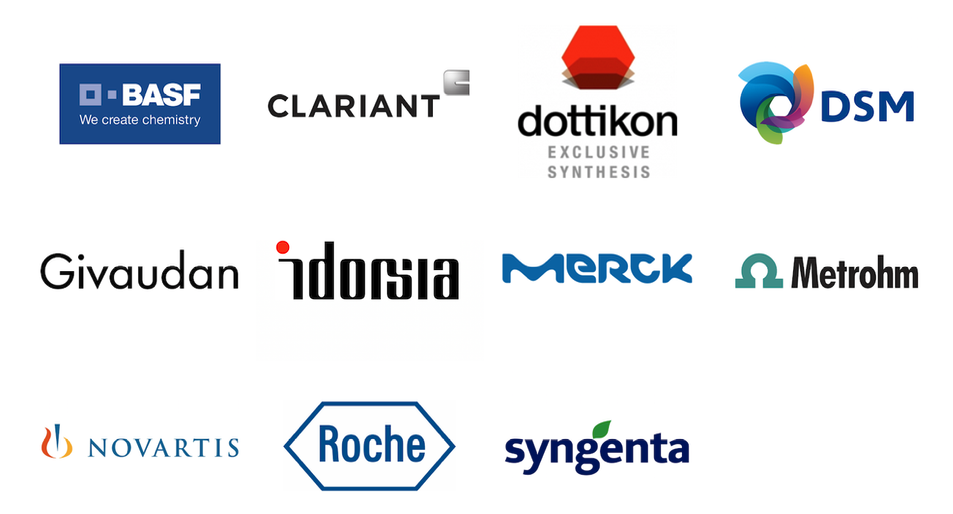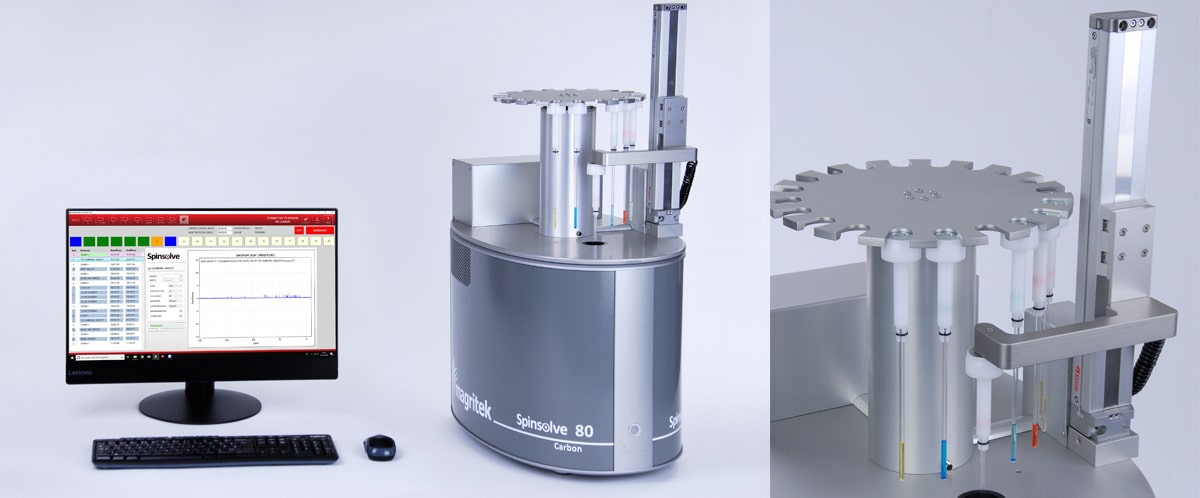Magritek Webinar: Spinsolve Benchtop NMR
 As an exhibitor at several SCS events Magritek wanted to present the Spinsolve Benchtop NMR instruments to the audience - paired with a discussion on the specific application fields of the customers. Due to the current virus situation all SCS events until end of August had to be postponed or shifted to the virtual room. Therefore we invite you to join our webinar.
As an exhibitor at several SCS events Magritek wanted to present the Spinsolve Benchtop NMR instruments to the audience - paired with a discussion on the specific application fields of the customers. Due to the current virus situation all SCS events until end of August had to be postponed or shifted to the virtual room. Therefore we invite you to join our webinar.
For multiple applications Benchtop NMR can replace wet chemical methods, thus Spinsolve is representing an environmentally friendly analytical approach. As Spinsolve instruments only require electricity to run, no liquid nitrogen or liquid helium is needed. Because the Spinsolve works with an external lock system, many applications do not need (deuterated) solvents, but the samples can be measured without sample preparation as-is. Using Spinsolve Ultra instruments, aqueous solutions like for instance waste water, beverages or body fluids like urine can be investigated with only minimum impact of the solvent (water) peak and with the option to run solvent suppression techniques.
For all that Magritek would like to present this attractive green NMR technology with its related application areas by organizing a webinar. Using the following link customers can reach the webinar session:
This webinar service is available at any time. Magritek would appreciate a registration, but customers may also proceed to the webinar directly without providing any contact details.
Magritek would be very pleased if many customers could join the webinar and Magritek is looking forward to answering any question of the audience. Thank you in advance.
With best regards and stay healthy
Your Magritek Team in Aachen
David Spichiger, SCS
29.05.2020
Chemistry Europe Newsletter
Chemistry Europe welcomes you to the latest edition of the Chemistry Europe Newsletter. This will keeping you up to date with the latest chemistry related issues, news and upcoming events. In the spotlight of this edition you will find the Chemistry Europe Fellowships 2018/19, an Interview with the youngest Board Member of the German Chemical Society a.m.m. Read more
You are also welcome to subscribe this Newsletter via ChemistryViews.org: https://www.chemistryviews.org/view/0/registration.html
Céline Wittwer, SCS
27.05.2020
scienceindustries setzt sich ab sofort noch stärker für Innovation ein
Ab sofort ist die neue Webseite von sciencindustries online (www.scienceindustries.ch): spannende Innovationen und wichtige Dossiers aus Chemie, Pharma und Life Sciences.
David Spichiger, SCS
25.05.2020
Brussels News Update, May 2020
European Highlights, Research, Innovation, Education, Entrepreneurship
8th EuChemS Chemistry Congress postponed to 2022
The COVID-19 pandemic that so deeply affects our lives and countries is not expected to end soon, and its consequences will be felt for a long time. We are thus forced to postpone the 8th EuChemS Chemistry Congress (ECC8) to 2022. ECC8 will still be held in Lisbon, Portugal, from 28 August to 1 September 2022.
More information is available on the ECC8 website and on its official Twitter account.
See the article here.
New President of the Board of Directors of the H.I.P.A.
The European Chemical Society congratulates the member of EuChemS Executive Board and Chair of Division of Chemistry and Environment, Professor Ioannis Katsoyiannis, for being appointed by the Greek Minister of Growth and Investments as President of the Board of Directors of the Hellenic Industrial Property Academy (H.I.P.A.). Read the article here.
EuChemS participated in the #EUvsVirus HackathonOn 24 – 26 April 2020, the European Commission organised an online pan-European Hackathon under the patronage of Mariya Gabriel, European Commissioner for Innovation, Research, Culture, Education and Youth. In total, 21,000 participants from across Europe met virtually to find solutions to the COVID-19 pandemic and its related-challenges.
The European Chemical Society is pleased to have taken part in the #EUvsVirus Hackathon and wants to thank the European Young Chemists’ Network (EYCN) for their initiative, active participation and inputs during this event. The European Chemical Society registered as a civil society and a partner to assist the teams and answer their chemistry-related questions. We will remain available in the future for all the participants wishing to connect with us.
Read more here.
Latest ECHA Committee for Risk Assessment meeting for harmonised classification and labelling
As reported by the EuChemS representative in the European Chemicals Agency (ECHA), the Committee for Risk Assessment (RAC) of ECHA met in May to address several pressing issues.
During the online meeting, RAC adopted the opinion concerning the limitation of skin sensitizing substances in finished articles made of fabric, leather, hide and fur, placed on the market for the first time. Also, the harmonised classifications of some insecticides used in agriculture have been evaluated, as well as the proposal to classify this insecticide as Carcinogenic. See the article here.
The European Commission reprioritised the budget of H2020 to fight the COVID-19 pandemic
On 4 May 2020, the European Commission announced in a press release the reprioritisation of the Horizon 2020 framework programme funding. To help reach the objectives of the Coronavirus Global Response, €1 billion will be invested to fight the COVID-19 pandemic. It will fund global research on vaccines. Read more about it here.
The European Commission launched the European COVID-19 Data Platform
On 20 April 2020, the European Commission, together with EU Members States and research partners, launched a COVID-19 Data Platform. The platform is part of the ERAvsCorona Action Plan and aims to accelerate Coronavirus research by facilitating data sharing and analysis. This joint effort underlines the European Commission’s commitment to Open Science, by making science more accessible and efficient in order to tackle societal challenges. Read more about it here.
Have you read the most recent edition of Chemistry in Europe Newsletter?
Chemistry in Europe 2020-2 includes many interesting articles, among other the Editorial by W. Koch, EuChemS Executive Board member on the Chemistry Europe, an interview with Dr Wolfgang Fritsche, one of the founders of FECS (Federation of European Chemical Societies), a predecessor organisation of EuChemS, a look into the European Parlamentary Committees (ITRE and ENVI Committees), a report from the 15th EYCN Delegate Assembly and many more. You are invited to read the full newsletter here.
MEPs call for including climate crisis action in the EU COVID-19 recovery plan
As the European Parliament is working on a strategy for the post-COVID-19 crisis period, MEPs asked to put the Green Deal at the centre of any reconstruction package.
Their proposal is based on conclusions drawn from strict quarantine measures taken everywhere in Europe. Indeed, air pollution has declined due to reduced economic activities (decline in travel, home working, shutdown of industry, etc.). Also, this request by the MEPs goes hand in hand with the EU Climate Law, which aims to make the EU climate neutral by 2050.
Read the article here.
Consultations & Roadmap
European Commission Public Consultations
A number of consultations put forward by the European Commission are currently open:
- ‘Climate Pact’
Deadline: 27 May 2020 - ‘2030 Climate Target Plan’
Deadline: 23 June 2020 - ‘Waste shipments – revision of EU rules’
Deadline: 30 July 2020
European Chemicals Agency Consultations
A number of consultations put forward by the European Chemicals Agency (ECHA) are currently open.
You can take a look at them here.
Fundings, Nominations & Awards
Marie Skłodowska-Curie (MSCA) open calls
Currently two calls are open: the individuals fellowships 2020 and the co-funding of regional, national and international programmes 2020.
More details here.
ERC Proof of Concept Grant
The ERC Proof of Concept Grant is available only to Principal Investigators who already have an ERC award to establish proof of concept of an idea that was generated during their ERC-funded projects. All Principal Investigators are eligible to participate in an ERC frontier research project that is either ongoing, or has ended less than 12 months before 1 January 2020.
Deadline: 17 September 2020
Click here to apply.
EuChemS Events
In the current environment and status of COVID-19, some events recognised by EuChemS are being postponed or cancelled.
EuChemS Events calendar is being updated on a regular basis.
If you planned to attend an event, you can check more about it here.
50th anniversary celebration
3 July 2020, 10 - 11.30 am, Online Event
Website: www.euchems.eu
2020 EuChemS General Assembly
24 September 2020, Online Event
Website: www.euchems.eu
8th EuChemS Chemistry Congress (ECC8)
28 August – 1 September 2022
Lisbon, Portugal
Website: www.euchems2022.eu
Read the full BNU newsletter here
EuChemS aisbl - Rue du Trône 62, 1050, Brussels, Belgium; www.euchems.eu. Produced for EuChemS by Nineta Hrastelj, Laura Jousset and Jelena Lazić. This newsletter has been carefully prepared and only contains correct information to the best of EuChemS´ knowledge, however this does not exclude the possibility of existence of incorrect information. EuChemS cannot be liable for the use or misuse of any information, whether correct or incorrect, present at this newsletter. Intellectual property belongs to its rightful owners, always explicitly traceable on each article. Compilation Copyright © 2020 EuChemS
Céline Wittwer, SCS
19.05.2020
Eleven Companies assigned as SCS Partners already
![]()
We implemented the SCS Partnership as a new strategic tool to strengthen our collaboration with industrial partners and to align our activities to the communities requirements.
Making the difference as an Institutional Partner through
- Active involvement in the strategic alignment of the society (board-, committee- and jury-membership)
- Becoming Industrial Science Award Program Stakeholders (former SISF Program)
- VIP Guests/Delegates at the Swiss Chemistry Science Night
… and also enjoying the benefits of “classical” corporate membership:
Free CHIMIA subscription, Publication of Company Reports in CHIMIA, Advertising at reduced rates, and Logo presence on SCS documents (print, digital)
We already assigned SCS Partnership agreements with the following companies:

Contact David Spichiger, SCS Executive Director, to become a Partner and discuss your ideas for a fruitful collaboration.
Céline Wittwer, SCS
15.05.2020
Page 51 of 305




